语义学
语言学课件语义学课件

• 专门意义例子(2)
• 从目光的光谱特性看,波长0.38微米~0.43微米的 光射到我们的视网膜上,我们看到的是紫光;波长 0.43微米~0.47微米的光射到我们的视网膜上,我 们看到的是蓝光;依次类推,0.47微米~0.5微米 是青光,0.5微米~0.56微米是绿光,0.56微米~ 0.59微米是黄光,0.59微米~0.62微米是橙光, 0.62微米~0.76微米是红光。所有这些波长或颜色
• (二)语义的概括性和具体性
• 语义所反映的人们对事物的认识,是一种概括的认识,词 语的意义概括了它所指的各个具体对象的共同特征。
• 语义作为人们言语交际的内容,在具体的话语中,又是比 较具体的。
二、语义的性质
• (三)语义的稳固性和变异性 • 为了保证交际顺利进行,语义必须具有一
定的稳固性。 • 语义是反映人们对客观事物的认识的,而
• 此外,为什么只能够说“东西南北”、 东南西北、东西、东北、西北、东南、 西南等却不能说“北南西东”、“北西 南东”等?
• 因为:东>西>南>北(“>”表示顺序优 先。)
思考
• 1、偏正结构中多个定语连用有一定的 条件限制,如:
• 大黄狗(*黄大狗) • 旧小木盆(*小旧木盆) • 新小白木床(*小新木白床) • 中等师范学校(*师范中等学校) • 古代哲学思想(*哲学古代思想) • 新版袖珍英汉词典(*英汉袖珍新版词典) • 大号塑料防风雨衣(*防风塑料大号雨衣)
• (二)义素
• 义素是构成义项的语义成分,是从一组相关的词语 中抽象出来的区别性语义特征,又叫语义成分、语 义特征、语义标示、语义原子等等。
• 传统语言学分析词语的意义,一般到义项为止,现 代语言学进一步把义项分析为若干义素的组合。如 “男人”这个义项可以分析为[男性、成年、人]。 其中[男性]、[成年]、[人]就是三个义素(方括号 [ ]是义素的标记),这三个义素组合起来,就构 成“男人”这个义项。
语言学语音学与语义学的基本概念

语言学语音学与语义学的基本概念语言学是研究语言的科学,旨在理解语言的起源、结构和发展,以及语言在社会和个体中的作用。
语言学可以分为多个学科领域,其中语音学和语义学是其重要组成部分。
语音学是语言学中研究语音和语音系统的学科,涉及到语音的产生、传播和感知。
它主要关注语音的物理特性和语音音位的研究。
语音学研究的基本概念包括音素、音位和语音。
音素是语音学中最基本的单位,是语言中具有区分意义的最小音段。
不同的语言有不同的音素系统,可以通过音素进行语音的分类和比较。
音位是指一个语言中具有意义差异的音素,它是词汇中音素的具体表现形式。
通过对音位的研究,可以揭示出语言中的音位规则和音位的变体形式。
语音学的另一个重要方面是语音感知和产生的研究。
语音感知涉及到人类对语音的听觉知觉和处理过程,包括语音辨认、语音分类和语音联想等。
语音产生则是研究人类如何通过声音的产生器官(如喉头、口腔等)产生语音的过程,以及语音的声学特性。
与语音学相对应的是语义学,它是研究语言意义和语言符号之间关系的学科。
语义学通过研究词汇和句子的意义,揭示语言中的语义规则和语义结构。
语义学研究的基本概念包括词义、句法和语言意义。
词义是语义学的基本单位,它涉及到词汇的本义、引申义和隐喻义等。
词义的研究可以通过语境分析和语义关系的建立来进行。
句法是研究句子结构和语法规则的学科,它涉及到词类、短语、句子成分的分析和描述。
语义学还通过研究句子的语义结构和句法规则,分析句子的意义和句子成分之间的关系。
语义学的研究对象也包括语言意义的组织和推理。
语言意义的组织包括语义关系、语义场和语义网络的建立,以及语义规则的运用。
语义推理则涉及到语义逻辑和语义推导的研究,通过语义关系的推理和语义规则的运用来理解和表达语言意义。
综上所述,语言学的基本概念主要包括语音学和语义学。
通过语音学的研究,我们可以了解语音的产生和感知规律。
通过语义学的研究,我们可以揭示语言的意义和语言符号之间的关系。
语义学之一

• 2、拟声词 • 拟声词的读音必须尽量与事物发出的声 音相象,否则不会被人们接受。经过比较, 汉语拟声词比英语的描写这些声音的名词 更逼真。如: • 打乒乓球——乒乒乓、乒乒乓乓 • 敲门声——咚咚咚、嘟嘟嘟、笃笃笃 • 鞭炮声—— 霹雳啪啦 • 雷声、炮声——轰隆、轰隆隆
• • • • • •
• • • 床前明月光,疑是地上霜。 举头望明月,低头思故乡。 都押阴平,表达对故乡的亲切和思念。
•
以上现在还是个人假设,以引起大家思考、探求音义结 合的理据性。
• 5、语义与重音 • (1)语法重音 • 句子里某些语法成分常常要重读, 以便准确表达出句子客观上所包含的 主要意思。主要动词、表性状或程度 的状语、表状态或程度的补语、表疑 问或指示的代词。
• 4、语义与声调 • 四声(平上去入)的名称,是南朝齐梁 之际沈约、王斌等提出的,关于四声的实际 读法,现在已不得而知。唐代僧人处忠《元 和韵谱》说:‘平声哀而安,上声厉而举, 去声清而远,入声直而促。’除入声外,说 得很含糊。明代僧人真空《玉钥匙歌诀》说: ‘平声平道莫低昂,上声高呼猛烈强,去声 分明哀远道,入声短促急收藏。’大约是从 四声的名称或当时的某种方言推出来的,除 入声外,很难说有什么切实的根据。”“人 们看到四声中平声调式平舒,其他三声或起 伏曲折或短促急迫,都不适于延长吟诵,于 是便把四声分为平、仄两类,仄就是不平的 意思。”
闪电声——呱嗒 吹风声——呼啦啦、呼呼呼 流水声—— 哗啦啦、潺潺、汩汩、淙淙 下雨声—— 淅沥淅沥、淅淅沥沥、哗啦啦 羊或小牛——咩咩 (miē) 狗——汪汪、狺狺(yí n) 猪等——咕噜 • 猫——喵喵 • 鼠——吱吱 • 蜜蜂、蚊子——嗡嗡
• baa:绵羊的叫声 bark:狗的叫声 bellow:(公牛)吼叫声 bleat:(羊或小牛)叫声;咩咩声 bowwow:(狗)汪汪声 bray:(驴等的)叫声 buzz:(蜜蜂、蚊子等)嗡嗡声 cackle:(母鸡下蛋后)咯咯声 cheep:(小鸡)唧唧声;(鸟等)啁啾声 chirp:(小鸟、昆虫等)啁啾声,唧唧 声,嘤嘤声
语义学(讲义)
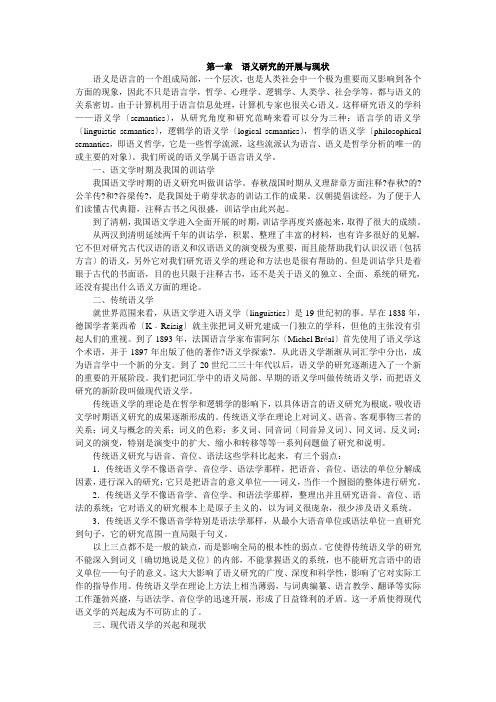
第一章语义研究的开展与现状语义是语言的一个组成局部,一个层次,也是人类社会中一个极为重要而又影响到各个方面的现象,因此不只是语言学,哲学、心理学、逻辑学、人类学、社会学等,都与语义的关系密切。
由于计算机用于语言信息处理,计算机专家也很关心语义。
这样研究语义的学科——语义学〔semantics〕,从研究角度和研究范畴来看可以分为三种:语言学的语义学〔linguistic semantics〕,逻辑学的语义学〔logical semantics〕,哲学的语义学〔philosophical semantics,即语义哲学,它是一些哲学流派,这些流派认为语言、语义是哲学分析的唯一的或主要的对象〕。
我们所说的语义学属于语言语义学。
一、语文学时期及我国的训诂学我国语文学时期的语义研究叫做训诂学。
春秋战国时期从义理辞章方面注释?春秋?的?公羊传?和?谷梁传?,是我国处于萌芽状态的训诂工作的成果。
汉朝提倡读经,为了便于人们读懂古代典籍,注释古书之风很盛,训诂学由此兴起。
到了清朝,我国语文学进入全面开展的时期,训诂学再度兴盛起来,取得了很大的成绩。
从两汉到清明延续两千年的训诂学,积累、整理了丰富的材料,也有许多很好的见解,它不但对研究古代汉语的语义和汉语语义的演变极为重要,而且能帮助我们认识汉语〔包括方言〕的语义,另外它对我们研究语义学的理论和方法也是很有帮助的。
但是训诂学只是着眼于古代的书面语,目的也只限于注释古书,还不是关于语义的独立、全面、系统的研究,还没有提出什么语义方面的理论。
二、传统语义学就世界范围来看,从语文学进入语义学〔linguistics〕是19世纪初的事。
早在1838年,德国学者莱西希〔K﹒Reisig〕就主张把词义研究建成一门独立的学科,但他的主张没有引起人们的重视。
到了1893年,法国语言学家布雷阿尔〔Michel Bréal〕首先使用了语义学这个术语,并于1897年出版了他的著作?语义学探索?。
第四章 语义学
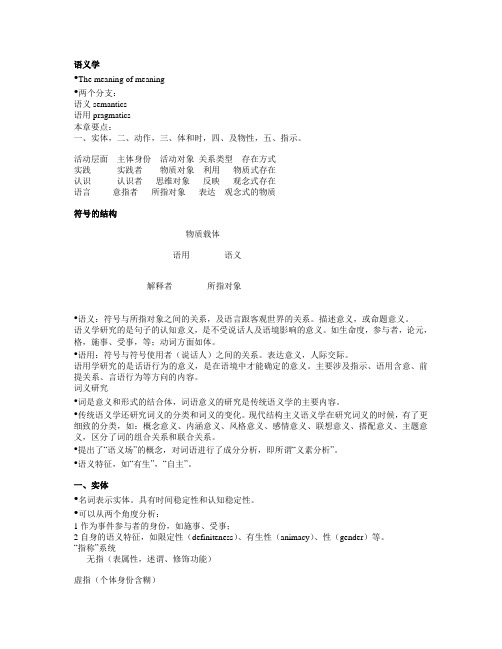
语义学•The meaning of meaning•两个分支:语义semantics语用pragmatics本章要点:一、实体,二、动作,三、体和时,四、及物性,五、指示。
活动层面主体身份活动对象关系类型存在方式实践实践者物质对象利用物质式存在认识认识者思维对象反映观念式存在语言意指者所指对象表达观念式的物质符号的结构物质载体语用语义解释者所指对象•语义:符号与所指对象之间的关系,及语言跟客观世界的关系。
描述意义,或命题意义。
语义学研究的是句子的认知意义,是不受说话人及语境影响的意义。
如生命度,参与者,论元,格,施事、受事,等;动词方面如体。
•语用:符号与符号使用者(说话人)之间的关系。
表达意义,人际交际。
语用学研究的是话语行为的意义,是在语境中才能确定的意义。
主要涉及指示、语用含意、前提关系、言语行为等方向的内容。
词义研究•词是意义和形式的结合体,词语意义的研究是传统语义学的主要内容。
•传统语义学还研究词义的分类和词义的变化。
现代结构主义语义学在研究词义的时候,有了更细致的分类,如:概念意义、内涵意义、风格意义、感情意义、联想意义、搭配意义、主题意义,区分了词的组合关系和联合关系。
•提出了“语义场”的概念,对词语进行了成分分析,即所谓“义素分析”。
•语义特征,如“有生”,“自主”。
一、实体•名词表示实体。
具有时间稳定性和认知稳定性。
•可以从两个角度分析:1作为事件参与者的身份,如施事、受事;2自身的语义特征,如限定性(definiteness)、有生性(animacy)、性(gender)等。
“指称”系统无指(表属性,述谓、修饰功能)虚指(个体身份含糊)无定(未识别的个体)实指(个体身份明确)有指(表个体)限定(已识别的个体)•无指:他是老师,木头房子•虚指:来客人了,请给孩子让座。
•实指:一只青蛙跳进池塘。
进来两个陌生人。
•限定:方枪枪也抬起头,只见自家那幢四层红砖楼赫然矗立在一枪射程内,顶层一间阳台上有一大一小两个人在凭栏远眺。
语言学研究中的语义学理论
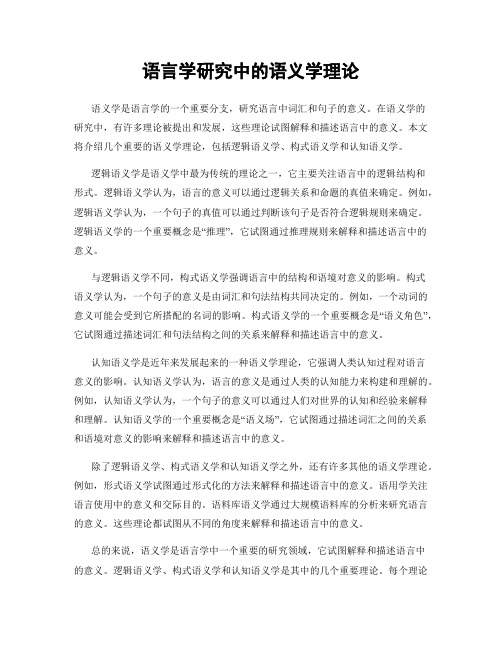
语言学研究中的语义学理论语义学是语言学的一个重要分支,研究语言中词汇和句子的意义。
在语义学的研究中,有许多理论被提出和发展,这些理论试图解释和描述语言中的意义。
本文将介绍几个重要的语义学理论,包括逻辑语义学、构式语义学和认知语义学。
逻辑语义学是语义学中最为传统的理论之一,它主要关注语言中的逻辑结构和形式。
逻辑语义学认为,语言的意义可以通过逻辑关系和命题的真值来确定。
例如,逻辑语义学认为,一个句子的真值可以通过判断该句子是否符合逻辑规则来确定。
逻辑语义学的一个重要概念是“推理”,它试图通过推理规则来解释和描述语言中的意义。
与逻辑语义学不同,构式语义学强调语言中的结构和语境对意义的影响。
构式语义学认为,一个句子的意义是由词汇和句法结构共同决定的。
例如,一个动词的意义可能会受到它所搭配的名词的影响。
构式语义学的一个重要概念是“语义角色”,它试图通过描述词汇和句法结构之间的关系来解释和描述语言中的意义。
认知语义学是近年来发展起来的一种语义学理论,它强调人类认知过程对语言意义的影响。
认知语义学认为,语言的意义是通过人类的认知能力来构建和理解的。
例如,认知语义学认为,一个句子的意义可以通过人们对世界的认知和经验来解释和理解。
认知语义学的一个重要概念是“语义场”,它试图通过描述词汇之间的关系和语境对意义的影响来解释和描述语言中的意义。
除了逻辑语义学、构式语义学和认知语义学之外,还有许多其他的语义学理论。
例如,形式语义学试图通过形式化的方法来解释和描述语言中的意义。
语用学关注语言使用中的意义和交际目的。
语料库语义学通过大规模语料库的分析来研究语言的意义。
这些理论都试图从不同的角度来解释和描述语言中的意义。
总的来说,语义学是语言学中一个重要的研究领域,它试图解释和描述语言中的意义。
逻辑语义学、构式语义学和认知语义学是其中的几个重要理论。
每个理论都从不同的角度出发,试图解释和描述语言中的意义。
通过研究这些理论,我们可以更好地理解语言的意义,进而更好地理解和使用语言。
语言学知识_语义学
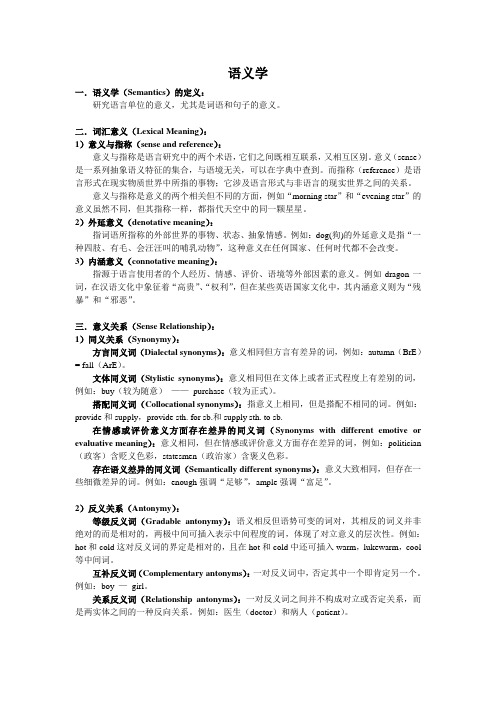
语义学一.语义学(Semantics)的定义:研究语言单位的意义,尤其是词语和句子的意义。
二.词汇意义(Lexical Meaning):1)意义与指称(sense and reference):意义与指称是语言研究中的两个术语,它们之间既相互联系,又相互区别。
意义(sense)是一系列抽象语义特征的集合,与语境无关,可以在字典中查到。
而指称(reference)是语言形式在现实物质世界中所指的事物;它涉及语言形式与非语言的现实世界之间的关系。
意义与指称是意义的两个相关但不同的方面,例如“morning star”和“evening star”的意义虽然不同,但其指称一样,都指代天空中的同一颗星星。
2)外延意义(denotative meaning):指词语所指称的外部世界的事物、状态、抽象情感。
例如:dog(狗)的外延意义是指“一种四肢、有毛、会汪汪叫的哺乳动物”,这种意义在任何国家、任何时代都不会改变。
3)内涵意义(connotative meaning):指源于语言使用者的个人经历、情感、评价、语境等外部因素的意义。
例如dragon一词,在汉语文化中象征着“高贵”、“权利”,但在某些英语国家文化中,其内涵意义则为“残暴”和“邪恶”。
三.意义关系(Sense Relationship):1)同义关系(Synonymy):方言同义词(Dialectal synonyms):意义相同但方言有差异的词,例如:autumn(BrE)= fall(ArE)。
文体同义词(Stylistic synonyms):意义相同但在文体上或者正式程度上有差别的词,例如:buy(较为随意)——purchase(较为正式)。
搭配同义词(Collocational synonyms):指意义上相同,但是搭配不相同的词。
例如:provide和supply,provide sth. for sb.和supply sth. to sb.在情感或评价意义方面存在差异的同义词(Synonyms with different emotive or evaluative meaning):意义相同,但在情感或评价意义方面存在差异的词,例如:politician (政客)含贬义色彩,statesmen(政治家)含褒义色彩。
语义学.5
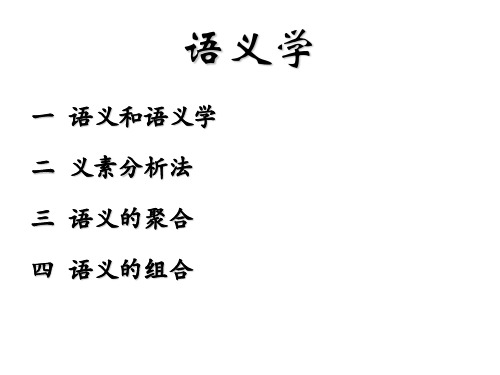
• • • • • • •
述谓结构分为四种类型:
1. 简单述谓结构(简单句)
• 2. 复合述谓结构(复句) • 3. 从属述谓结构(述谓结构做主语或者宾语) • 4. 降格述谓结构(述谓结构做定语)
述谓结构分析
• 简单述谓结构:
• A. 他 昨天 给我 买了 几本书。
•
A
T
D
V
O
• B.小王 在黑板上 用粉笔 画了 一幅画。
• 作业:
• 用义素分析法分析: • 1. 躲避(故意离开或隐藏)
• 2. 躲藏(把身体隐藏起来)
• 义素分析法的不足: • 第一,主观色彩较浓。例如:
• 第二,义素数量较多。 • 第三,缺乏周遍性。只适合于部分实词, 很难对全部实词做义素分析。比如,打、
搞、为、爱、恨等等。
三
语义的聚合
• 一、语义场 • 语义场理论是德国著名语言学家特里尔首 先提出来的。他从索绪尔关于语言系统性 的理论中受到启发,在《智能义域中的德 语词汇》(1931年出版)一书中提出了语义 场理论。 • 语义场理论与差不多同时兴起的义素分析 理论一起,奠定了现代语义学的基础。
• 附加意义的几个类型: • 一 属性类附加意义: • 1. 次要理性意义:比如“山”的概念意义为“地 面形成的高耸部分”,此外还有次要语义特征, 如: • ①人山人海 • (如山聚集土石之多) • ②海誓山盟 • (如山一样永恒) • ③铁证如山 • (如山一样确定不移) • ④执法如山 • (如山一样坚定不动摇)
• 例如: • (1)法律语域:配偶、前科、伙同
• (2)商业语域:抢手货、紧俏商品
• (3)备忘录、豁免、最后通牒 • ……
九 外来色彩的附加意义: 如:托福(TOEFL)、图腾(totem)、嬉皮士 (hippy)等。
语义学
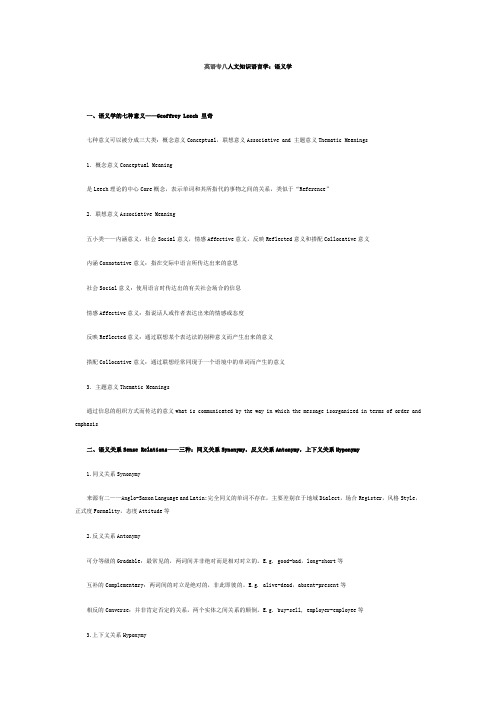
英语专八人文知识语言学:语义学一、语义学的七种意义——Geoffrey Leech 里奇七种意义可以被分成三大类:概念意义Conceptual,联想意义Associative and 主题意义Thematic Meanings1. 概念意义Conceptual Meaning是Leech理论的中心Core概念,表示单词和其所指代的事物之间的关系,类似于“Reference”2. 联想意义Associative Meaning五小类——内涵意义,社会Social意义,情感Affective意义,反映Reflected意义和搭配Collocative意义内涵Connotative意义:指在交际中语言所传达出来的意思社会Social意义:使用语言时传达出的有关社会场合的信息情感Affective意义:指说话人或作者表达出来的情感或态度反映Reflected意义:通过联想某个表达法的别种意义而产生出来的意义搭配Collocative意义:通过联想经常同现于一个语境中的单词而产生的意义3. 主题意义Thematic Meanings通过信息的组织方式而传达的意义what is communicated by the way in which the message isorganized in terms of order and emphasis二、语义关系Sense Relations——三种:同义关系Synonymy,反义关系Antonymy,上下义关系Hyponymy1.同义关系Synonymy来源有二——Anglo-Saxon Language and Latin;完全同义的单词不存在,主要差别在于地域Dialect,场合Register,风格Style,正式度Formality,态度Attitude等2.反义关系Antonymy可分等级的Gradable:最常见的,两词间并非绝对而是相对对立的。
(完整版)语义学理解
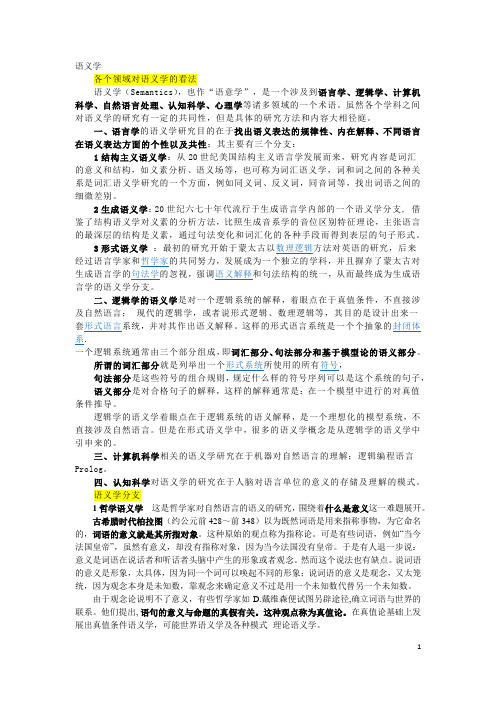
语义学各个领域对语义学的看法语义学(Semantics),也作“语意学”,是一个涉及到语言学、逻辑学、计算机科学、自然语言处理、认知科学、心理学等诸多领域的一个术语。
虽然各个学科之间对语义学的研究有一定的共同性,但是具体的研究方法和内容大相径庭。
一、语言学的语义学研究目的在于找出语义表达的规律性、内在解释、不同语言在语义表达方面的个性以及共性;其主要有三个分支:1结构主义语义学:从20世纪美国结构主义语言学发展而来,研究内容是词汇的意义和结构,如义素分析、语义场等,也可称为词汇语义学,词和词之间的各种关系是词汇语义学研究的一个方面,例如同义词、反义词,同音词等,找出词语之间的细微差别。
2生成语义学:20世纪六七十年代流行于生成语言学内部的一个语义学分支, 借鉴了结构语义学对义素的分析方法,比照生成音系学的音位区别特征理论,主张语言的最深层的结构是义素,通过句法变化和词汇化的各种手段而得到表层的句子形式。
3形式语义学:最初的研究开始于蒙太古以数理逻辑方法对英语的研究,后来经过语言学家和哲学家的共同努力,发展成为一个独立的学科,并且摒弃了蒙太古对生成语言学的句法学的忽视,强调语义解释和句法结构的统一,从而最终成为生成语言学的语义学分支。
二、逻辑学的语义学是对一个逻辑系统的解释,着眼点在于真值条件,不直接涉及自然语言;现代的逻辑学,或者说形式逻辑、数理逻辑等,其目的是设计出来一套形式语言系统,并对其作出语义解释。
这样的形式语言系统是一个个抽象的封闭体系.一个逻辑系统通常由三个部分组成,即词汇部分、句法部分和基于模型论的语义部分。
所谓的词汇部分就是列举出一个形式系统所使用的所有符号,句法部分是这些符号的组合规则,规定什么样的符号序列可以是这个系统的句子,语义部分是对合格句子的解释,这样的解释通常是:在一个模型中进行的对真值条件推导。
逻辑学的语义学着眼点在于逻辑系统的语义解释,是一个理想化的模型系统,不直接涉及自然语言。
语言学语音学与语义学
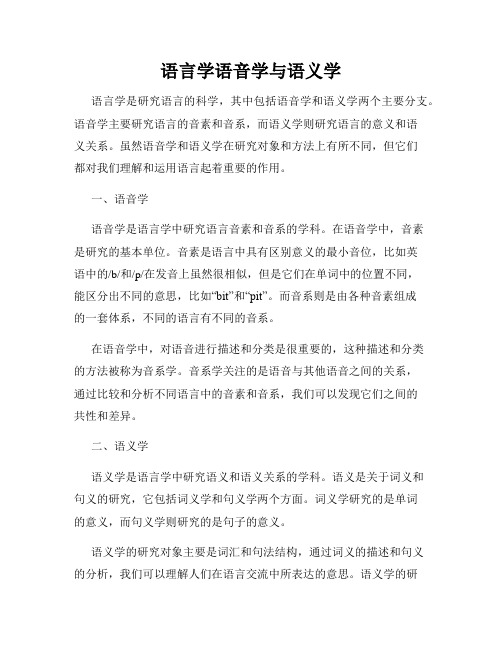
语言学语音学与语义学语言学是研究语言的科学,其中包括语音学和语义学两个主要分支。
语音学主要研究语言的音素和音系,而语义学则研究语言的意义和语义关系。
虽然语音学和语义学在研究对象和方法上有所不同,但它们都对我们理解和运用语言起着重要的作用。
一、语音学语音学是语言学中研究语言音素和音系的学科。
在语音学中,音素是研究的基本单位。
音素是语言中具有区别意义的最小音位,比如英语中的/b/和/p/在发音上虽然很相似,但是它们在单词中的位置不同,能区分出不同的意思,比如“bit”和“pit”。
而音系则是由各种音素组成的一套体系,不同的语言有不同的音系。
在语音学中,对语音进行描述和分类是很重要的,这种描述和分类的方法被称为音系学。
音系学关注的是语音与其他语音之间的关系,通过比较和分析不同语言中的音素和音系,我们可以发现它们之间的共性和差异。
二、语义学语义学是语言学中研究语义和语义关系的学科。
语义是关于词义和句义的研究,它包括词义学和句义学两个方面。
词义学研究的是单词的意义,而句义学则研究的是句子的意义。
语义学的研究对象主要是词汇和句法结构,通过词义的描述和句义的分析,我们可以理解人们在语言交流中所表达的意思。
语义学的研究有助于我们理解句子的结构和语言的意义,从而更好地理解语言的功能和应用。
三、语言学的应用语言学对于我们的日常生活和学习有着广泛的应用。
首先,在语音学方面,语音学的研究可以帮助我们更好地学习和掌握不同语言的音素和音系。
比如,通过学习语音学知识,我们可以正确地发音,避免发音错误造成的理解困难。
其次,在语义学方面,语义学的研究可以帮助我们理解和运用语言的意义。
通过掌握词义和句义的知识,我们可以更准确地理解他人的表达,避免产生误解或歧义。
此外,语言学在语言教学和翻译方面也有重要的应用。
通过了解不同语言的音系和语义差异,我们可以更好地进行语言教学和翻译工作,提高语言的学习和应用水平。
总结起来,语言学的研究对于我们理解和应用语言起着重要的作用。
语言学概论——3语义

3. 语义3.1 语义的本质•3.1.1 语义和语义学•语义指的是语言形式和言语(语用)形式表现出来的意义。
语言形式和言语形式主要由语言的载体——语音构成。
所以,我们说的语义,指的是语音形式表现出来的语言和言语的全部内容。
•语义学是研究语言的意义的学科。
根据语义研究的历史发展过程,可以把它分为传统语义学和现代语义学两个时期。
•传统语义学诞生于19世纪末,由法国语言学家布雷阿尔于1893年创造(借用希腊语词根sēma创造了一个法语词sémantique,英语转写为semantics)。
•传统语义学研究是以词义为轴心的,它只注重研究词义的构成、发展和演变,语义学只是词汇学的一个分科。
•现代语义学的研究在深度和广度上都超过了传统语义学,它一方面向纵深发展,进入了语义的微观层次,产生了义素和语义场的研究;另一方面,它又扩大了语义学的研究范围,跨进了句子的领域,研究句义结构,并且进一步把语义放在语言的运用中加以考察,研究语义在语言使用中的变化。
3.1.2 语义的生成和理解•语义是人脑对客观世界和现象的概括认识。
语义的生成和理解的过程大致如下:刺激结果固化•客观事物大脑意义语音•认识•客观事物刺激或作用于人的大脑,大脑便用自己的认识结构去认识、解释,经过多次反复,逐渐形成比较明确的认识成果,这个成果以一定的语音形式物化、固化下来,就形成了语义。
3.1.3 语义三角“语义三角”理论最早由美国学者奥克登和理查兹在《意义的意义》(The Meaning of Meaning)一书中提出。
•所谓“语义三角”指的是语义、语音、客观事物之间处于一种三足鼎立、相互制约、相互作用的关系之中。
•所示:•语音和词义之间的关系是形式和内容的关系,语音形式表达语义内容;词义和客观事物之间是反映和被反映的关系,词义是对客观事物的概括反映;语音和客观事物之间没有必然的联系(用虚线连接),语音形式只有通过词义才能成为客观事物的符号,去标记客观事物,因此,二者是标记与被标记的关系。
生成语义学

生成语义学语义学是研究语言意义的学科,它涵盖了词汇、句子、语篇等多个层面的研究,旨在揭示语言意义的本质和机理。
语义学的研究对象是语言中的符号,而符号是指具有语义范畴的有意义的语言单位,包括词汇、短语和句子。
语义学的研究方法主要有语音分析、语法分析、语用分析和语义分析等多种,这些方法有助于我们深入理解语言意义的多个方面。
语义学的基本概念包括词义、句义和语篇义。
词义是指词汇的含义,它有时是抽象的,有时是具体的,它涉及了该词汇所表示的事物、概念、属性、动作等等。
句义是指句子的意义,即由词义组合而成的语块的意义,这种意义不仅仅是词义之和,还包括过程、态度、推论等多个方面。
语篇义是指文本的总体意义,即由句义、语用特征和语篇背景等多个因素组成的文本意义,它在交际过程中发挥着重要作用。
语义学关注的问题包括语义范畴、语义关系和语义变化等。
其中,语义范畴是指词汇与语言现实之间的对应关系,是构成语言意义基础的重要概念。
语义关系是指词汇之间的关系,单个词汇可以通过同义词、反义词、上下义词等多种语义关系来描述。
而语义变化则是指语言意义在时间和空间上的变化,这种变化可以是词义的演化,也可以是语境上词义的变化。
语义学在实际应用中有着广泛的应用,例如机器翻译、信息检索、文本分析等。
在机器翻译中,语义学可以通过识别语言的语义结构和语义特征,从而帮助计算机进行翻译。
在信息检索方面,语义学的方法可以通过分析文本的语义和关系,从而更准确地找到相关内容。
在文本分析中,语义学的分析可以揭示文本的真正含义和目的,以及文本之间的关系和联系。
总之,语义学是研究语言意义的学科,它揭示了语言意义的本质和机理,并为我们理解语言现象提供了重要的工具和方法。
即使在科技发达的现代社会,语义学仍然具有重要的应用和研究意义。
好玩的语义学知识

好玩的语义学知识语义学是研究语言意义的学科,它探讨的是语言表达与实际意义之间的关系。
在语义学中,有许多有趣的知识和概念,下面我将介绍一些好玩的语义学知识。
一、词义的多样性词义的多样性是语义学中一个非常有趣的现象。
同一个词在不同的语境中可能具有不同的意义。
比如,词汇“银行”可以指代金融机构,也可以指代河岸边的土地。
这种多样性使得语言更加丰富多彩。
二、词义的模糊性词义的模糊性是指一个词可能有多个意思,但是在具体的语境中很难确定其具体含义。
例如,词汇“苹果”可以指代一种水果,也可以指代一家知名的科技公司。
当我们在交流中遇到这种模糊性时,需要根据上下文来进行推断和理解。
三、歧义的产生语义学研究的另一个有趣问题是歧义。
当一个句子有多个解释时,就会产生歧义。
例如,“我看见了一个老人和一个孩子”这个句子可以有两种解释:老人和孩子是两个不同的人,也可以是老人就是孩子。
这种歧义在日常交流中常常出现,给语言理解带来了一定的困难。
四、语义的推理语义学研究的一个重要方向是语义推理。
通过对语言的推理,我们可以根据已有的信息来推测未知的信息。
例如,当我们说“今天很热,我要去买冰淇淋”,可以推理出我是因为热而去买冰淇淋。
语义推理在自然语言处理和人工智能领域有着广泛的应用。
五、隐喻的运用隐喻是一种通过比喻和象征来传达意义的修辞手法。
它通过将一个概念映射到另一个概念来达到意义的丰富和表达的效果。
隐喻在日常交流中经常被使用,使得语言更具有生动性和表现力。
例如,“他是我的太阳”这句话通过隐喻的方式表达了对某人的喜爱和依赖。
六、语义的变化随着时间的推移,语义会发生变化。
词汇的含义可能会随着社会、文化和环境的变化而改变。
例如,词汇“病毒”在过去可能只指代一种疾病的病原体,而现在也可以指代计算机病毒。
这种语义的变化使得语言不断适应新的需求和变化。
七、语义的关联语义学研究的一个重要问题是词汇之间的关联。
词汇之间可能存在一定的关联性,比如上下义关系、同义关系、反义关系等。
语义学课期末总结6篇

语义学课期末总结6篇第1篇示例:语义学是一门研究语言意义的学科,旨在探讨语言中词汇、句法和语境之间的关系,以及语言如何传达信息和意义。
这门课程的学习对于理解语言结构、沟通和交流具有重要意义。
在本学期的语义学课程中,我们学习了许多关于语言意义的重要概念和理论,同时也进行了一些实践性的学习和讨论。
在这篇文章中,我将总结本学期所学的内容,并对我的学习成果和体会进行回顾和总结。
在本学期的语义学课程中,我们学习了关于词汇语义的基本概念,如词义和词汇关系。
我们通过分析不同词汇之间的意义关系,如同义词、反义词、上下位词等,了解了词汇之间的联系和差异。
这有助于我们更深入地理解词汇的使用和选择,提高我们的语言表达能力和沟通效果。
我们学习了关于句法和语义的关系。
句法是语言中规定句子结构和成分顺序的规则,而语义则是研究句子意义的学科。
在课程中,我们探讨了句法结构如何影响句子的意义,以及如何通过句法分析来理解句子中的语义信息。
通过这些学习,我们能够更好地理解和解释句子的含义,提高我们的语言理解和表达能力。
我们还学习了语篇分析和语用学的相关知识。
语篇是指一段连贯的语言材料,语篇分析则是研究这些语言材料的组织和意义。
在课程中,我们学习了如何分析和理解语篇中的逻辑关系和语用信息,从而更好地理解语言交流和推理过程。
这有助于我们在写作和口语表达中更清晰地传达信息和意义,提高我们的沟通效果和表达能力。
本学期的语义学课程让我收获颇丰。
通过学习词汇语义、句法语义、语篇分析和语用学等知识,我对语言意义的理解和应用有了更深入的认识。
我不仅提高了对语言结构和沟通过程的认识,也提高了自己的语言表达和理解能力。
希望在今后的学习和工作中,我能够继续运用这些知识和技能,不断提升自己的语言能力和沟通效果。
【完】第2篇示例:语义学是语言学的一个重要分支,研究语言的意义和语言单位之间的关系。
语义学课程作为现代语言学的重要组成部分,对于理解语言的意义和交流起着至关重要的作用。
语言学概论:第五章_语义学

老太太[+人 +女性 +年老 +褒义] 老太婆[+人 +女性 +年老 +贬义]
三、前提义素和断言义素
前提义素——是与邻界词共同的义素,是确定该 词义与邻界词义有共同联系的义素,是反映事 物一般特征的。
断言义素——是与邻界词不同的义素,是确定 该词义与邻界词义相区别的义素,是反映事物 本质特征的。
语法意义包括词法意义和句法意义,即指词的 形态特征、各种语法单位间的关系意义(陈述、 支配等)。
2、言语意义: 言语意义是指人们在使用语言交流时受到语
言环境的影响而临时产生的意义。
第二节 义素与义素分析
一、义素性质:词义的区别特征就是义素,义素就是 对词的语义特征进行分析以期得到的最小的语义单 位。
3、义素分析具有相对性
也就是说在不同情况下词义分解为义素可以不一 样。如: “酒精” 一般人只了解它的外表特征和可作消毒药品的一般功 能 医疗工作者还有认识它具有使人中毒的特性 化工专业的人还能认识它作试剂,化工原料,燃烧等 特征 这样,不同职业的人对该词义义素的划分就会不同:
一般人:(1)无色液体;(2)药品;(3)用 于消毒
第五节 语义的组合
下面作一简单介绍。 相当于句子的语义单位——表述。连带表述的
意思——话语。对表述进行切分就获得相当于词、 短语的“义丛”,义丛由义素组成。
在一个表述中,在句法上起谓语作用的义丛 叫“谓词”,起主、宾等作用的义丛叫谓项。 关系: 表述 分解为 义丛 分解为 义素 (意义) (谓语+谓项)
3、义素分析可以检验词的搭配关系是否合理。
第三节 词义
一、词义的内容: 1、词汇意义: 即理性意义、概念意义。 2、语法意义 3、色彩意义: (1)情态色彩: (2)语体色彩 (3)时代色彩:
- 1、下载文档前请自行甄别文档内容的完整性,平台不提供额外的编辑、内容补充、找答案等附加服务。
- 2、"仅部分预览"的文档,不可在线预览部分如存在完整性等问题,可反馈申请退款(可完整预览的文档不适用该条件!)。
- 3、如文档侵犯您的权益,请联系客服反馈,我们会尽快为您处理(人工客服工作时间:9:00-18:30)。
5.Reflected meaning(反映意义)
• porn
blue ( foreigners )
3.Social meaning(社会意义)
• What is communicated of the social circumstances of language use.语言所表达
•
• • • 的关于使用该语言的社会环境意义。 Dialect: the language of a geographical region or of a social class. Province: language of law, of science, of ad, etc. Status: polite, colloquial, slang, etc. Modality: language of memoranda, lectures, jokes, etc.
6.Collocative meaning(搭配意义)
• What is communicated through association with words which tend to occur in the environment of another word.(通过联
想词语的常用搭配所表达 的意义)
Semantics
The analysis of meaning
• 6.1 the study of meaning 6.2 reference and sense • 6.3 classification of lexical meanings 6.4 lexical sense relations • 6.5 describing lexical meaning: componential analysis • 6.6 words and concepts • 6.7 semantic relations of sentences • 6.8 metaphors • 6.9 metonymy
concept (thought)
symbolizes
refers to
symbol
(word)
stands for
referent
(entity)
6.3 classification of lexical meanings
1. 2. 3. 4. 5. 6. 7. Conceptual meaning Connotative meaning Social meaning Affective meaning Reflected meaning Collocative meaning Thematic meaning
各个单词在句中所受强调的不同程度来组织信息 的方式所表达的意义) • e.g. --- What did he write?
--- He wrote Semantics. --- Who wrote Semantics? --- It was written by Leech.
6.4 lexical sense relations
Associative meaning
1.Conceptual meaning(概念意义)
• Also: sense, or logical, cognitive, referential or denotative meaning. • Concerned with the relationship between a word and the thing (content) it denotes, or refer to.
• emotional, fragile, and easily breaking into tears
connotative meaning
• Connotative meaning is subject to culture and experience. yellow ( Chinese )
• What is communicated through association with another sense of the same expression.(通过联想同一词语的其他意
思所表达的意义)
• e.g. chicken leg drumstick chicken breast white meat
• Formal: steed
• General: horse • Slang: nag • Baby language: gee-gee
•
•
Contradictory in style can cause humors
e.g. ladies and guys
前途是光明的,道路是拐弯的
4.Affective meaning(情感意义)
6.2 reference and sense
• Reference • Reference refers to the relation by which a word picks out or identifies an entity in the world. • The referential theory is the simplest theory of meaning, claiming that meaning is reference. • Sense • Words stand not only in relation to the world but also to human mind.
6.1 the study of meaning
• Meanings of ‘meaning’
meaning linguistic non-linguistic
conventional intentional
natural conventional intentional
1. Smoke means fire. 2. Red light means stopping. 3. A handshake and a hug mean the same thing. 4. What did she mean by that wink? 5. What does democracy mean ? 6. What does „Publish or Perish‟ mean ? 7. --- Are you hungry? --- Do you mean to treat me to dinner now? 8. She means well although her remarks are too harsh to accept.
Distinction between sense and reference
• Sense and reference are two terms often encountered in the study of meaning, they are two related but different aspects of meaning. • Sense is concerned with the inherent meaning of the linguistic form. It is the collection of all the features of the linguistic forms; It is abstract and decontextualized. • Reference means what a linguistic form refers to in the real physical world; it deals with the relationship between the linguistic element and that non-linguistic world of experience.
6.4.1 Synonymy • Words which have different forms but
similar meanings.
dialectal synonyms synonyms of different styles
Classification
synonyms of different registers
2. Synonyms of different styles Words differing in styles or in terms of formality. e.g. gentleman – guy 马铃薯– 土豆 pass away – die
3. synonyms of different registers Words similar in meaning but used in different spheres. e.g. sodium chloride – salt
synonyms differing in affective meaning synonyms differing in collocation
1. Dialectal synonyms Words similar in meaning but used in different dialects. e.g. flat (British English) apartment (American English) autumn (British English) fall (American English) 山药---土豆
• Mother---female parent • Woman---female human adult
